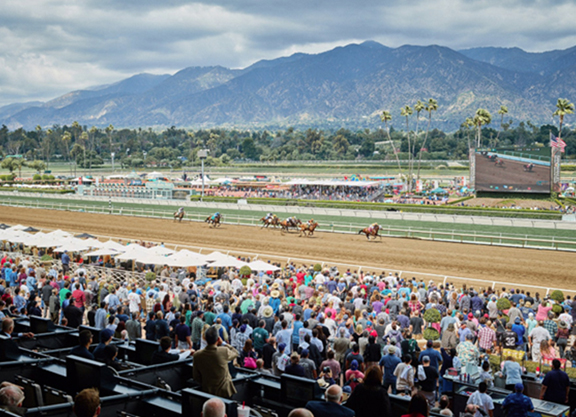By T. D. Thornton
After a nearly two-hour public commentary period that included repeated–and at times emotionally charged–appeals from animal-rights activists for the California Horse Racing Board (CHRB) to end horse racing in the state, the board on Thursday advanced four rule changes pertaining to equine medication, safety, and welfare.
As expected, the Apr. 18 monthly meeting at Santa Anita Park was conducted against the tense backdrop of 23 recent equine fatalities at the track, and it led off with updates on how the CHRB is working in conjunction with the Los Angeles County District Attorney's investigation into the deaths.
“There are four CHRB investigators working full-time on the investigations,” CHRB executive director Rick Baedeker reported. “I believe that all but one of the necropsies have been completed. The CHRB has issued more than 70 subpoenas for documents. Cooperation has been very good from all responding parties.”
As the subject segued to Thursday morning's national announcement about the proposed Lasix phase-out by a coalition of United States tracks, CHRB chairman Chuck Winner lauded the initiative as being “very, very good” for the industry while clarifying what it meant for California at the regulatory level.
“The agreement between The Stronach Group and the Thoroughbred Owners of California (TOC) that was voted on at our last meeting with respect to the use of Lasix in California at the current meets at Golden Gate and Santa Anita [is] not affected by this [national] agreement,” Winner explained. “Our rules go a little further with respect to same-day medication, and the reduction of the use of Lasix to 5 cc's [from 10 cc's], that continues.”
Summaries of the four rule changes that advanced to the 45-day public commentary period follow:
1) At the March CHRB meeting, the board voted to suspend previously allowed use of steroidal and non-steroidal anti-inflammatory (NSAID) drugs through the current Santa Anita and Golden Gate meets. On Thursday, the CHRB voted unanimously to extend that measure so it applies to all breeds and race meets in the state for a 12-month period.
“There have been no violations under the new regulation,” said CHRB equine medical director Rick Arthur, DVM. “The fact of the matter is that this has worked very well.”
2) The CHRB voted unanimously to advance a new rule that would set threshold limits for authorized medications that would be tested for after timed workouts. According to the CHRB's informational packet for the meeting, “the goal of the proposed regulation would be to eliminate the use of pain-masking medications that increase the chance of injury for a horse running at full speed.”
According to Arthur, “what we're going to be proposing here is…setting thresholds consistent with the [Association of Racetrack Commissioners International] 48-hour stand-down requirements.”
3) Presently, a post-mortem exam is required to be performed on every horse that dies on a CHRB-licensed property. But there is no formal process for reviewing necropsies with the human connections of those horses.
“Currently, trainers and other licensees are being asked to voluntarily participate in a review of post-mortem reports of fatalities of horses in their care,” said CHRB vice chairman Madeline Auerbach. “This rule would make that review mandatory. And on top of what we've just all been though, I hate to put it this way, but I think it's a no-brainer.”
This proposed rule addition advanced by a unanimous vote.
4) A rule that would make trainers responsible for keeping accurate medication treatment records for all horses under their care advanced by a 5-1 vote.
According to the CHRB packet, this rule would be similar to existing International Federation of the Horse (IFHA) and British Horseracing Authority (BHA) requirements.
One pertinent Thursday agenda item that will be brought back for consideration at the CHRB's May meeting involves a bisphosphonates prohibition.
The CHRB will be seeking to align restrictions on bisphosphonates with existing IFHA and BHA regulations. But the board decided on Thursday it needs to fine-tune the proposal's language prior to voting on it.
“We were trying to figure out why [bisphosphonates usage in racehorses] is even here,” Auerbach said. “What is the legitimate purpose of that within the horse population? And the truth is, there is no legitimate purpose. There is no reason for it to be at the racetrack. And we want it gone.”
Added Arthur: “I certainly don't see a legitimate reason. There are some veterinarians [in favor of bisphosphonates] that are gong to have to defend it at the next meeting, and I told them that. I'm fine with prohibiting it. I don't think it fits.”
Earlier in the meeting, it took less than 90 seconds for the CHRB to move past a controversial agenda item that only last week had been the sole actionable subject of an emergency meeting called for Apr. 12.
It dealt with the “possible reallocation of race dates” at Santa Anita. That Apr. 12 meeting was scrapped before it happened, and the agenda item was re-slotted for the Apr. 18 monthly meeting.
Winner said that the reallocation of dates was no longer topical because the racing at Santa Anita since its Mar. 29 reopening “has been really good … and personally I see no reason to move the race dates … There is no discussion. There is no action. We wish you to continue a good and safe meet.”
Not a subscriber? Click here to sign up for the daily PDF or alerts.






